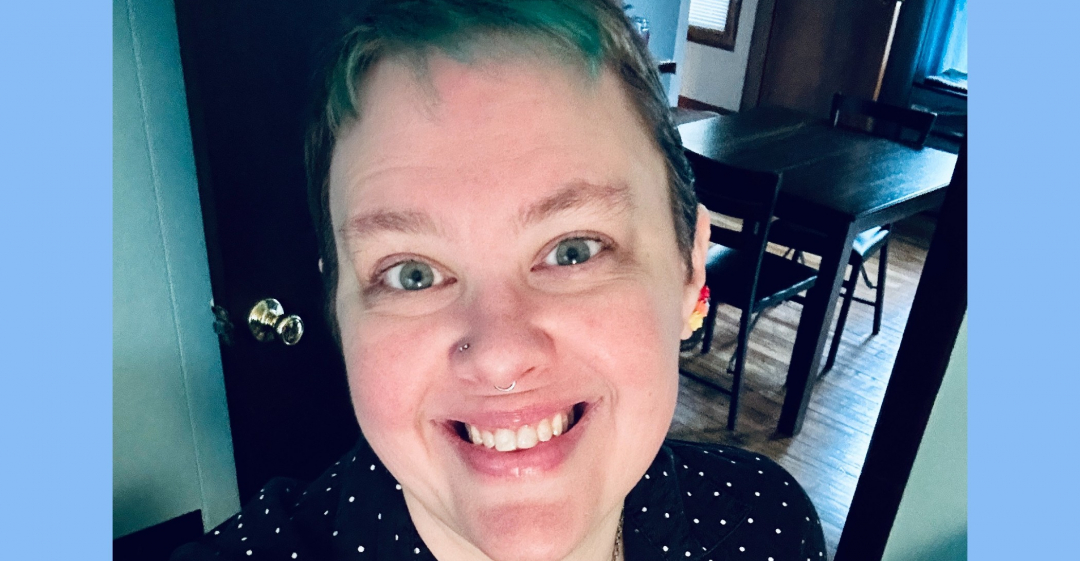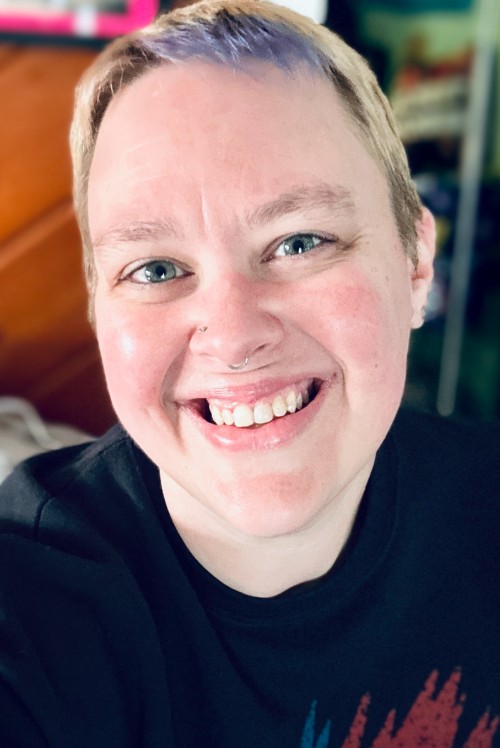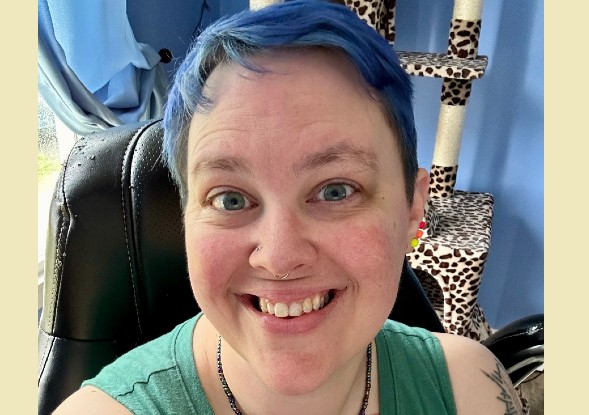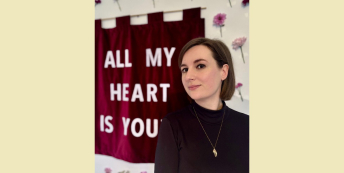“I noticed that I was actively dreading returning to my job.”

Newly Updated
What work were you doing previously?
I worked as a history museum professional for more than ten years.
Specifically, I worked in collections management/conservation, then I was a curator for a few different museums. I ended my career as the executive director for a small county historical society.
What are you doing now?
Now I’m a freelance personal finance writer and editor.
Why did you change?
My last year in museums was impacted by the pandemic.
I ended up having to leave my second to last position (as the curator for a regional and transportation history museum) in a hurry, after I was told that my pay would be cut if I stayed.
The museum was closed for several months during spring and summer of the first year of the pandemic, and without visitor and program revenue, the finances were very strained (a sadly common instance for museums at the time).
It was my intention to remain in that position for another year (I'd been there more than four years by that point), as I really enjoyed the work.
Unfortunately, the pay was not enough for me to be able to do much more than just barely stay afloat, and as I lived alone and wanted to be able to keep that lifestyle, I started looking for another position.
I was hired to become the executive director for a tiny historical society in a rural area in my region, and since I wanted to stay in this part of the country, I went for it. It turned out to be a poor fit, due to the remoteness of the area, and the job itself was disastrous for my mental health. I ended up in therapy.
The institution has now been through five executive directors in the last four years due to massive ongoing governance problems with the board of trustees (when I left I was replaced, and then my replacement was replaced, and now that person has also left).
When was the moment you decided to make the change?
I noticed that I was actively dreading returning to my last museum job when I had some time off for the festive break at the end of the first year of the pandemic.
I'd never felt that way before, and had always been the kind of person who loved my work.
Not long after, I began to look to change careers.
How did you choose your new career?
I focused my application efforts on roles that were fully remote (as I was tired of moving constantly for museum jobs that didn’t pay enough).
I focused on digital content roles, as that career path has a lot of connections to what I did for museums (research, writing, and other content creation). I ended up getting hired to become a copy editor with an SEO marketing company.
I left this role recently, as my freelance work took off last year. I was making more money and enjoying the work much more, so I quit my employee role and am now a full-time freelancer.
Are you happy with the change?
Yes.
Now I have much more income and I really love the work I’m doing.
I was relieved when I switched from museums to editing, but I didn’t really become happy until I reached a point with my finances where I could afford to quit my employee position and just be a freelancer.
What do you miss and what don't you miss?
I miss the work I did as a museum curator – specifically research, and writing and creating exhibits and public programs.
I also miss working with college and graduate students, who would intern at the museums I worked for to get experience in the field.
And I miss talking to museum visitors who enjoyed my work and learned from it.
I don’t miss moving house every few years for jobs that didn’t pay enough for me to do things like buy a home or travel. I don’t miss the lack of job security.
I also don’t miss how, in my last museum role, I was hired to do a job and then had people getting in my way at every turn.
How did you go about making the shift?
When I decided I needed to get out of museums, I started applying for new jobs at a rapid clip (over 400 in just five months).
I got some help from one of my partners to improve my LinkedIn profile, to put more focus on my transferable skills.
I also paid for career counselling and a resume/CV rewrite from Flexjobs (which was a great resource for the career change process).
How did you develop (or transfer) the skills you needed for your new role?
Having flexibility, kindness, and communication skills has gone a long way towards getting employers interested in me for editing roles.
In my LinkedIn profile and on my resume, I played up my experience with writing, editing, research, and also my experience working with all different kinds of people.
What didn’t go well? What wrong turns did you take?
I wish I hadn’t undervalued myself when I was asked about salary requirements for my first official editing job.
But at the time I was desperate to get hired by someone and get out of museums.
If I'd asked for more money, I might not have struggled so much financially during the first year of my shift.
How did you handle your finances to make your shift possible?
I didn’t really have the luxury of making enough money in my old career to be able to put much aside for the switch.
I was able to save enough to pay for my move that occurred at the same time as my career change, at least. Since I was going to be working remotely, I had planned a move to a new city that I wanted to live in for personal reasons, rather than career reasons.
What was the most difficult thing about changing?
I loved a lot of the work I did in museums, and it does hurt to think about how I’m not doing that anymore.
I also sometimes struggle with feeling guilty that I’m no longer working for nonprofit organisations, as I always felt really good that the work I did made a difference.
What help did you get? 
The help I got from a partner with revamping my LinkedIn page to focus on digital content was definitely important to making the transition.
I’m also glad I was able to afford to pay for career counselling and resume/CV help.
What resources would you recommend to others?
LinkedIn is a great way to make connections with recruiters and those in the line of work you’re wanting to switch to.
Glassdoor is another great resource for job postings and to learn more about companies you’re considering.
What have you learnt in the process?
I learned that it isn’t worth clinging to a career that's no longer working for me, even though I did it for more than ten years and went to graduate school for it.
And I learned that there are many ways to be happy at work.
What do you wish you'd done differently?
I wish I hadn’t waited so long.
I definitely got complacent. Looking back, I wish I’d started looking for a new career opportunity before the pandemic.
Instead, my old career prospects changed because of COVID-19, where I had to find a new museum position in a hurry so I didn’t lose money.
What would you advise others to do in the same situation?
Don’t be afraid to change if your old career is no longer serving you.
It’s very unrealistic to expect that you’ll stay in the same career for your entire working life.
And if your life isn’t where you want it to be (and you’re unable to plan for the future due to a lack of money), then definitely look into making a change.
We caught up with Ashley recently to see how her shift was working out, roughly a year and a half on. Here's what she's been up to, and the biggest lessons she's learned.

What's changed for you in your career since we first published your story?
I'm still working as a full-time freelancer in personal finance content, but I've broadened my skills.
I'm fortunate that my main client gives me the opportunity to work on different assignment types, like product reviews and updates to informational pages, so it's been great to get experience with this kind of work. It means more earning power for me now and perhaps also in the future.
I also get to do more work with SEO (search engine optimization), which is another in-demand skill, so I'm happy to be building up that particular muscle too!
How do you feel about your work now?
I still really enjoy it and feel as if I learn something new every day!
That was always one of my favorite things about museum work, so I'm happy to still be in that position even in a new career.
I also love being able to set my own schedule. That was one of the qualities of freelancing that attracted me initially.
I still work more than full-time hours, but it feels good to be holding the reins of my own career.
I also love my colleagues and I've made some real friends among them.
What challenges have you come up against since making your shift, and how exactly have you dealt with them?
Being a freelancer in the U.S. means paying a lot in taxes and on health insurance, but I'm coping.
After some health issues last year, I ended up signing on for a more expensive health insurance plan for this year. Now we're almost halfway through the year, and of course I haven't been sick and have therefore only used it once, for a bit of routine care.
If I keep this same plan next year, the premium is set to go up in price, and could cost me almost $900 a month, not ideal. If and when I left freelancing for another employee role, it would be a great relief to lower my costs there.
How is the financial side of things panning out, and is this what you'd expected?
Other than the increasing costs of insurance, the financial side has been going well thus far.
I actually just became a homeowner, and this was something I started thinking about not long after changing careers, but it took becoming a freelancer to make it a reality.
I paid off a lot of debt after I started freelancing, then started saving to buy a house. I started searching for a place to buy earlier this year and as I write this, it's been a week since I moved into my new home.
It's a little scary to think about this big commitment I made, but I feel better knowing I have savings in the bank and I'm building the kind of professional skills that should make me marketable into the future.
I didn't really expect this outcome, but I did want it. If I'd known my life could look like this a few short years after switching careers, I would have gotten serious about making the shift much sooner.
What have you learned, since making your shift?
Never having had the opportunity to work full-time remotely before when I was in museums, I learned that this is a way to work that really agrees with me and my life.
I love being able to fit work around my life, rather than vice versa.
And being able to work more and earn more was never a possibility for me in full-time salaried roles before, either.
I definitely tipped over into being a slight workaholic last year, but thankfully, I've also learned how to moderate my work and slow down and enjoy life before (which has also been good for my physical and mental health).
Is there anything else you'd like to share?
Life's too short to be miserable in your job.
It's hard, but you can make a change, and you'll be better off for it.
To find out more about Ashley's services, visit www.clippings.me/users/mareaditingservices
What lessons could you take from Ashley's story to use in your own career change? Let us know in the comments below.



